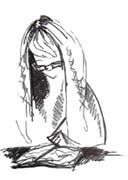 My friend Laila, who loaned me Zola's The Earth, assured me that Zola is one of the most depressing authors ever, and after I finished the book I had to agree with her--his artistic treatment of humans as animals is bleak, sad, and violent. But there's an absorbing quality to his writing that makes it difficult, no matter how many times you try, to leave his books unfinished.
My friend Laila, who loaned me Zola's The Earth, assured me that Zola is one of the most depressing authors ever, and after I finished the book I had to agree with her--his artistic treatment of humans as animals is bleak, sad, and violent. But there's an absorbing quality to his writing that makes it difficult, no matter how many times you try, to leave his books unfinished.THERESE RAQUIN is a "grim tale of adultery, murder and revenge in a nightmarish setting," according to the back of the book. Why did I try Zola again, you may ask, since I found The Earth so depressing? I'd have to shrug and mumble something like "I found it in the free box at Michael's Books, and, well...". It seemed worth a shot. And it was. It was worth a shot.
Perhaps one of the best parts of the book is the preface--and by no means to I intend to put down the novel itself by making this assertion. Zola's rebuttal to the critics of his day who found the book pornographic and offensive (more on this later) is scathing and delicious, well-written and direct. It opens like this:
I was simple enough to suppose that this novel could do without a preface. Being accustomed to express my thoughts quite clearly and to stress even the minutest details of what I write, I hope to be understood and judged without preliminiary explanations. It seems I was mistaken.And he goes on to whip those critics into shape:
Obviously my work is the property of my judges and they can find it nauseating without my having any right to object, but what I do complain of is that not one of the modest journalists who blushed when they read Therese Raquin seems to have understood the novel. If they had, they might perhaps have blushed still more, but at any rate I should at the present moment be enjoying the deep satisfaction of having disgusted them for the right reason. Nothing is more annoying than hearing worthy people shouting about depravity when you know within yourself that they are doing so without any idea what they are shouting about.I could go on quoting the preface forever, but instead, I turn to the novel and wonder what pornography the critics were referring to--sure, there are sex scenes (it's about adultery, after all), and perhaps it was simply that the times were different and any mention of sex at all was naughty, but it seems to me that, if one was looking for something in THERESE to object to, one might take issue with how very disturbing and grotesque the story is. Two lovers murder the husband that stands between them and then find themselves haunted by his corpse--not his ghost, mind you, his bloated and decaying corpse.
I do not take issue with it. The book is fascinating, but it's creepy as all get out--thank God it's short, that's all I'm saying. But Zola's storytelling is furious and intense from the very first chapter and for all 256 pages I was hooked. Grossed out, half-afraid to turn the lights off, but hooked.
RATING: 3

No comments:
Post a Comment